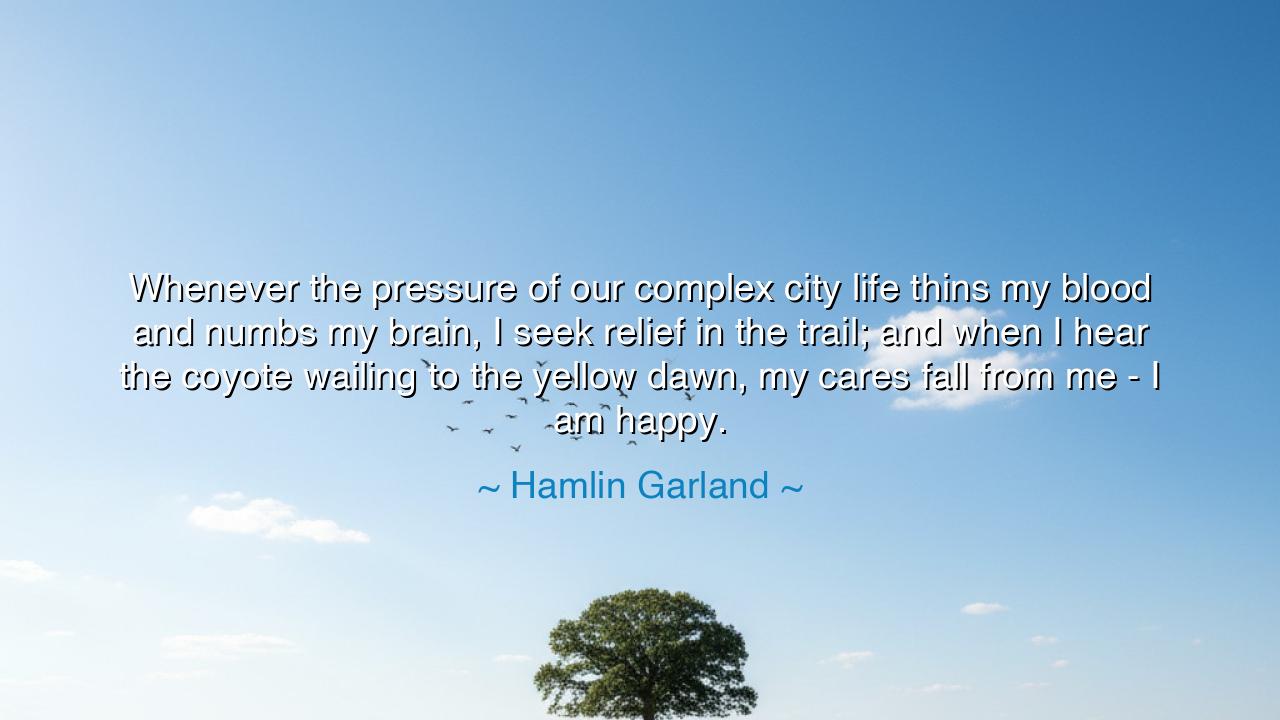
Whenever the pressure of our complex city life thins my blood
Whenever the pressure of our complex city life thins my blood and numbs my brain, I seek relief in the trail; and when I hear the coyote wailing to the yellow dawn, my cares fall from me - I am happy.






Hamlin Garland, son of the prairies and teller of the American frontier, once declared with the voice of one weary of the city: “Whenever the pressure of our complex city life thins my blood and numbs my brain, I seek relief in the trail; and when I hear the coyote wailing to the yellow dawn, my cares fall from me — I am happy.” In these words, he speaks the eternal cry of man, torn between the demands of civilization and the healing simplicity of nature. For the city, with its noise, its speed, and its endless burdens, can drain the spirit; but the open trail, with its silence and its wildness, restores the soul to strength and joy.
The origin of this truth lies in Garland’s life and work as a writer of realism and the land. Born in Wisconsin, raised among fields and farms, he knew the toil of rural life, yet also its purity. As he grew into a man of letters, he spent time in the growing cities of America, where he witnessed both opportunity and oppression. He felt the pressure of modern life — the crowd, the machinery, the ceaseless pace. To him, relief was not found in salons or drawing rooms, but in the call of the open trail, where the voice of the coyote under the dawn sky reminded him of primal freedom, stripping away the cares of man-made complexity.
History offers countless echoes of this truth. Recall the life of Theodore Roosevelt, who after the death of his wife and mother on the same day, fled to the Badlands of Dakota. There he sought relief in the wilderness, riding horseback through open plains, breathing the cold air, hearing the wild sounds of night. In those rugged landscapes he found renewal, rebuilding his body and spirit, and preparing himself to lead a nation. Like Garland, Roosevelt knew that nature has the power to heal where cities only wound.
So too did the ancient prophets and sages recognize this power. Moses retreated to the mountain, Elijah to the desert, the Buddha to the Bodhi tree. In solitude and silence, far from the clamor of crowds, each found clarity of vision. The trail, whether through forest, plain, or wilderness, has always been the path of purification. The cry of the coyote, or of any wild creature, is a reminder that life is more than commerce and noise — it is mystery, and beauty, and belonging to a world not made by man.
The lesson Garland gives us is clear: when the soul is weary, return to the earth. When the pressure of life dulls your spirit, do not seek escape in distraction, but seek relief in creation. The rising dawn, the voice of wild creatures, the open sky — these are medicines for the weary heart. The trail does not ask you for status, wealth, or performance. It asks only that you walk, that you listen, that you remember you are alive. And in that remembering, happiness is restored.
What, then, shall we practice? Let each of us carve out time to leave behind the city’s endless clamor and step into the quiet of woods, fields, or mountains. Let us walk slowly, breathing deeply, until our blood warms again and our minds are clear. Let us honor the wild voices — the coyote, the bird, the wind — as teachers reminding us of balance. Even in modern life, where trails are fewer, we can find a park, a riverbank, a patch of green, where nature still speaks her eternal words.
Therefore, O children of the restless age, remember Garland’s wisdom: “Whenever the pressure of our complex city life thins my blood and numbs my brain, I seek relief in the trail... and I am happy.” Do not let the machine of modernity rob you of life. Return to the trail. Seek the dawn. Listen to the cry of the earth. There, your cares will fall away, and you will rediscover the joy that lies not in possessions nor in power, but in the eternal embrace of nature herself.






AAdministratorAdministrator
Welcome, honored guests. Please leave a comment, we will respond soon